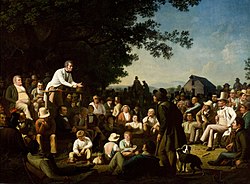Speech used by a politician
For the comic stump speech, see Stump speech (minstrelsy).
This article is about political speeches. For more general use, see Soapbox.

A political stump speech is a standard speech used by a politician running for office. Typically a candidate who schedules many appearances prepares a short standardized stump speech that is repeated verbatim to each audience, before opening to questions. [1]
